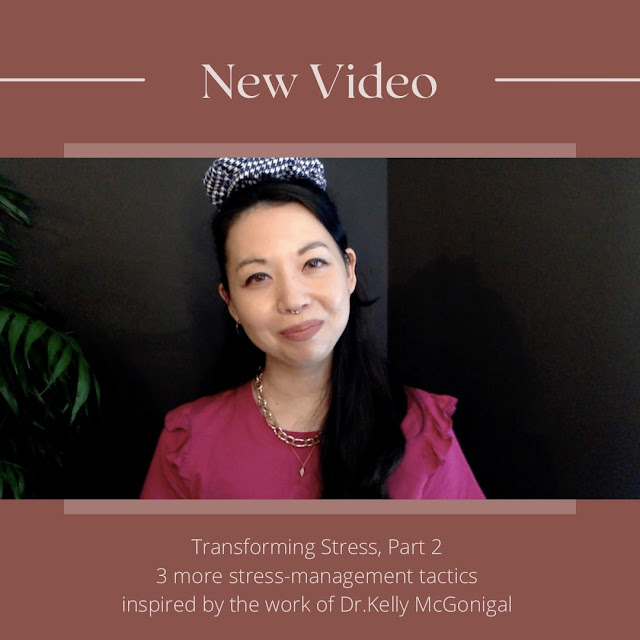VIDEO: Transforming Stress, Part 2
In this second and final video inspired by Dr. Kelly McGonigal's The Upside of Stress, here are three more stress-management exercises.
Welcome to Part 2 of the Stress video where I’m focusing on some exercises from Stanford health psychologist and lecturer Dr. Kelly McGonigal’s book The Upside of Stress: Why Stress is Good For You, and How To Get Good at It. This video will cover a few more things you can try when you are stressed out in the moment and want to transform that stress into something meaningful.
DID YOU MISS THE FIRST VIDEO?
THIRD EXERCISE: Think Big Picture
For this exercise, McGonigal refers to the work of fellow psychology researcher Jennifer Crocker who encourages us to turn our own self-focus into so-called “bigger-than-self goals.”
Crocker sat through a professional development workshop where the leaders, “argued that if you see yourself as a part of something bigger - a team, an organization, a community, or a mission - it takes the toxicity out of striving”
“A ‘bigger-than-self goal’ is defined as a purpose that goes beyond the goals of personal gain and success. A bigger-than self goal is not an objective goal, like getting a promotion, or a reward, like being praised by your boss. It is more about how you see your role within your community - what do you want to contribute, and the change you want to create. When you strive from this mindset […] you increase your chance of reaching both your professional and bigger-than-self goals—and you also experience more joy and meaning along the way”
- from The Upside of Stress by Kelly McGonigal, PhD
So let’s give it a go. McGonigal advises,
“When you feel stress rising at work or in any other important areas of your life, ask yourself,
What are by bigger-than-self goals?
How is this opportunity going to serve them?"
McGonigal suggests that if you’re struggling to find a bigger-than-self goal, consider spending a few moments reflection on one or more of these questions:
What kind of positive impact do you want to have on the people around you?
What mission in life or work most inspires you?
What do you want to contribute to the world?
What change do you want to create?
- from The Upside of Stress by Kelly McGonigal, PhD
FOURTH EXERCISE: Remember You’re Not Alone
With this exercise, McGonigal wants us to turn isolation into common humanity.
She reminds us, “people who feel alone in their stress are more likely to become depressed and to rely on avoidant coping strategies, including denial, giving up on their goals, and trying to avoid stressful experiences."
So here’s the exercise: “When you feel isolated or alone in your suffering, try connecting to the truth of common humanity."
"First, allow yourself to feel whatever thoughts and emotions come up when you think about your situation. Acknowledge whatever the underlying pain is: anxiety, physical pain, anger, disappointment, self-doubt, or sadness.Then, consider the possibility that this source of suffering is part of the human experience. Just like you, countless other people know what it’s like to feel this pain, regret, sadness, injustice, anger, or fear. […] allow yourself to feel natural sense of empathy for these people — an understanding of what they must be feeling in their own situations."
- from The Upside of Stress by Kelly McGonigal, PhD
 |
| Above: from Kelly McGonigal's instagram |
McGonigal likes to end this reflection with a phrase that captures the sense of shared experience such as, "‘may we all know our own strength’ or ‘may we all find peace' or ‘may we all be supported through this suffering,’ and of course ‘may we all know that we are not alone.’ In this way, you bring a bit of the hope and courage that feeling connected provides.”
RECAP: End this reflection with phrases like:
May we all know our own strength
May we all find peace
May we all be supported through this suffering
May we all know we are not alone
- from The Upside of Stress by Kelly McGonigal, PhD
Quick Exercise - helping someone who is stressed
I’m going to leave you with one last exercise from The Upside of Stress for when you want to help someone who is stressed, even if you yourself are not stressed.
It’s simple - tell them you think they can handle it:
“If you want to help people better cope with anxiety, a more useful strategy might be to simply tell them that you think they an handle it. Studies show that when people are told, "you're the kind of person whose performance improves under pressure," their actual performance improves by 33 percent. It doesn't matter whether the feedback is completely random.What matters is that the message changes the meaning of those first signs of anxiety. Instead of signalling 'you're about to blow it' the nerves are proof that you're getting ready to excel. Telling people who are nervous that they need to calm down can convince them they don't have what it takes. Trusting them to handle the pressure can help them rise to the challenge.”
- from The Upside of Stress by Kelly McGonigal, PhD
RESOURCES
- VIDEO: The Importance of Listening at Work
- The Upside of Stress: Why Stress is Good For You, and How To Get Good at It by Kelly McGonigal, PhD
- Did you know empathy is actually a learnable skill/strength? This video explains how/why!
- Empathy at Work—Why It (Really) Matters by Career Contessa
- How to support a struggling friend by Elise Kalokerinos on Psyche
- Lost perspective? Try this linguistic trick to reset your view by Ariana Orvell on Psyche


